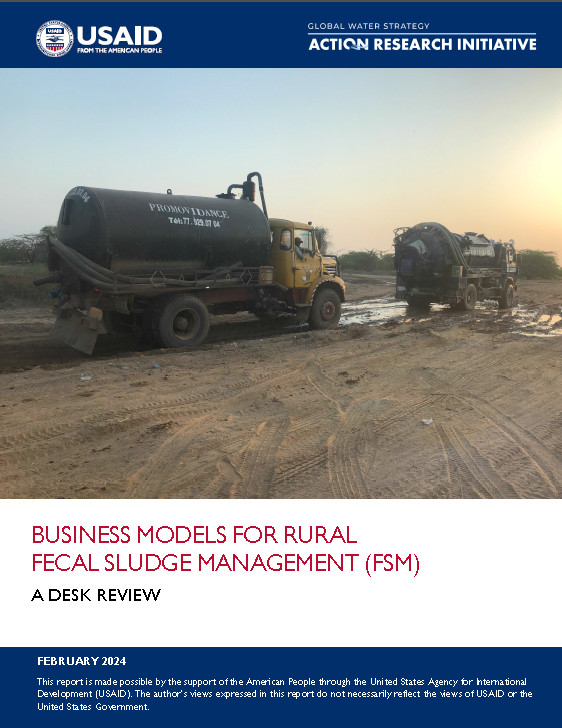Business Models for Rural Fecal Sludge Management (FSM): A Desk Review
 |
rapport Feb 2024 ; 82 pages
Aut. Rishi Agarwal & Subhash Chennuri
Ed. USAID - Washington
Téléchargeable sous format: PdF
Téléchargeable chez l'éditeur
Page de présentation d'un éditeur
Abstract:
By analyzing several examples in Asia and sub-Saharan Africa, interviewing experts, and reviewing the literature, this review sought to understand the market for rural fecal sludge management (FSM) services, suitable methods along the sanitation value chain, and viable business models involving the private sector (PS) for safe FSM in rural areas. However, few examples of safe rural FSM services with private sector (PS) participation emerged from expert interviews and secondary research. Therefore, the desk review team widened its scope to include examples from peri-urban and medium-high population rural settlements (i.e., towns, rural growth centers, or equivalent local settlement classifications) for lessons that could be applied in the wider rural context. The team reviewed nine cases, including a potential innovation to desludging wet toilets safely, and complemented the findings and guidance with relevant literature.
The objective of this review is to contribute to the knowledge base on area-wide safe FSM solutions, which also may include household-managed and government-operated services. Contents:
1. Introduction . 1
2. Approach and summary of examples reviewed . 2
2.1 dhenkanal, india . 5
2.2 rural ethekwini, south africa . 6
2.3 chazanga and kanyama (peri-urban lusaka), zambia . 7
2.4 khadak, nepal . 9
2.5 leh, india . 11
2.6 sakhipur, bangladesh . 12
3. Key findings: market and methods . 16
3.1 demand for recurring fsm services in rural markets exists . 16
3.2 rural demand patterns and human resources are not conducive to emerging small-scale treatment methods . 18
3.3 manually emptying dry toilets can be made safer, but wet toilets require innovation . 23
4. Key findings: fsm business models . 26
4.1 business models for safe fsm tend to be implemented by public bodies . 26
4.2 a ppp involves either fsm service management or facilitation by a public body 26
4.3 ppp models aim to offer affordable, safe services with value propositions of better response time and cleanliness . 28
4.4 pb-managed models may offer advantages to a public body in ease of monitoring and progress toward gesi goals . 30
4.5 viability of current fsm models appears unlikely and requires ongoing external financial and technical support . 32
4.6 grouping several rural settlements could potentially improve the viability of rural fsm services . 36
5. Preliminary guidance . 38
5.1 ppp fsm business models are likely applicable in a subset of rural contexts where basic treatment methods are feasible . 38
5.2 public bodies can take several measures to broaden the applicability of ppp fsm business models . 40
6. Areas for further research . 46
7. References. 48
8. Annexes . 55
A.1 list of fsm examples identified. 55
A.2 safely managed sludge as a share of total sludge generated (sources and estimates) . 56
A.3 role of alternating dual pit latrines in fsm policies for rural areas . 59
Mots clefs: |
boues (gestion des ) (CI) (DT) (OP) (ope) , boues (traitement des ) (CI) (DT) (OP) (ope) , rural (CI) (DT) (OP) (ope) |
Editeurs/Diffuseurs: |
|
USAID
-
US Agency for International Development - Washington - Etats Unis |
FSG
-
FSG Reimagining social change - Boston - Etats Unis |
En cas de lien brisé, nous le mentionner à communication@pseau.org